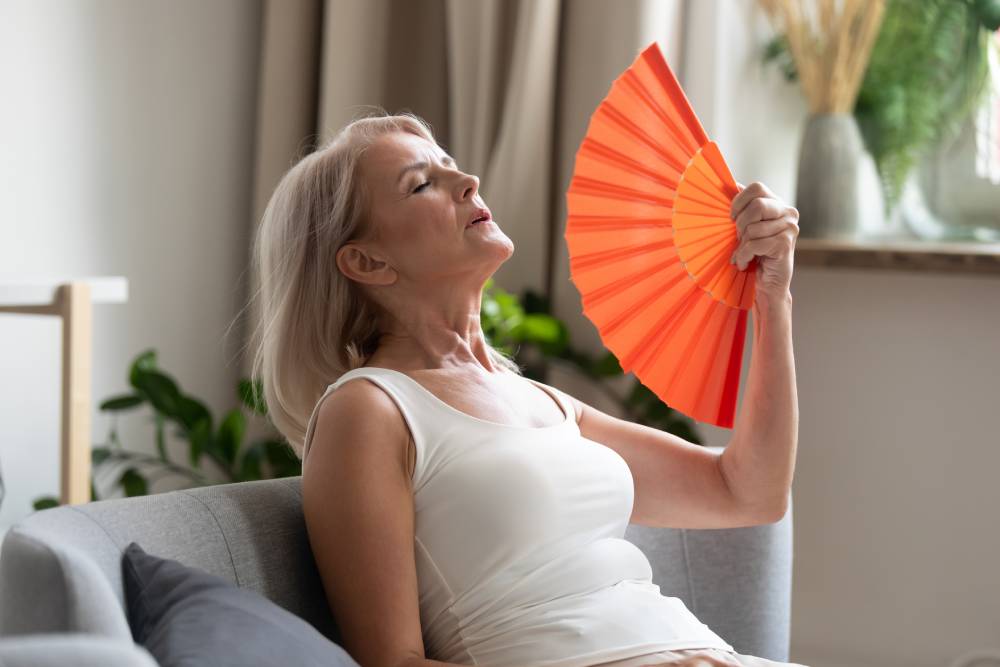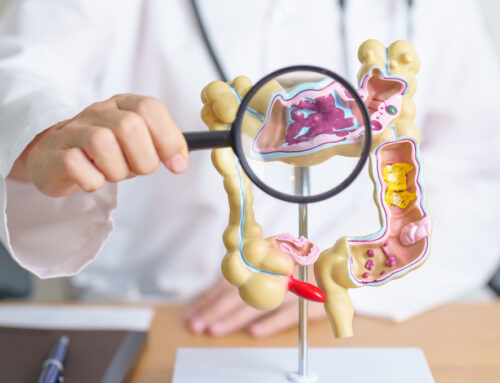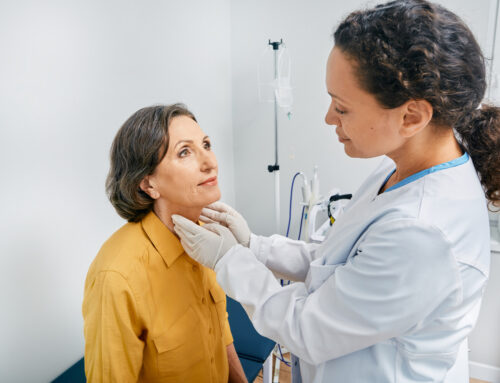
Stressed annoyed old senior woman using waving fan suffer from overheating, summer heat health hormone problem, no air conditioner at home sit on sofa feel exhaustion dehydration heatstroke concept
Menopause, like many of life’s health transitions, can vary from woman to woman, depending on a variety of factors. If you’re preparing to enter menopause, or you’re already in the midst of it, it’s only natural to be curious about the length of the process. You may be wondering things like: How long does menopause last? Which menopause treatment is most effective? What are the signs of coming to the end of menopause? Below, we try to answer all of these questions by giving you the facts that every woman entering menopause should know.
What Is Menopause?
Every woman gets to the point in her life where her body will experience a natural decline in reproductive hormones. This new phase in her life is called menopause, and usually occurs when a woman reaches her 40s or 50s.Your body will naturally produce less estrogen as you enter your 40s, and the amount created will gradually decrease until you stop menstruating completely. So, when does menopause end? Medically, it is considered finished once you have not had a period for an entire calendar year.
However, when does menopause end in terms of symptoms? There are three stages to it: perimenopause, menopause, and post menopause. You can start menopause treatment during perimenopause to make the process more comfortable and reduce some of the unpleasant symptoms like vaginal dryness, insomnia, and hot flashes. You can also receive treatment during menopause and post menopause as this can accelerate the end of your symptoms.
While natural menopause occurs in three phases, if you have your ovaries removed or a hysterectomy, you will experience menopause, as well. This, of course, is a unique situation, so working with a doctor to manage symptoms and plan ahead can ensure you are as comfortable as possible. Your doctor can also answer any questions that you might have, including the signs you can look out for to tell you are coming to the end of menopause.
How Long Does Menopause Last?
If you are amid menopause, it’s understandable if you are wondering, “When does menopause actually end?” or “Does menopause end at all?” The process can be uncomfortable, and it can make it tough to feel your best. It might surprise you to learn that what people often refer to as menopause is actually known as the first phase of menopause, perimenopause.
Perimenopause begins when your menstrual cycle changes and ends when menstruation completely halts. Because this period is transitional, the amount of time that it lasts can vary from woman to woman. You might start to experience shorter or longer cycles than usual, have hot flashes, or experience night sweats.
Most women start perimenopause in their mid-to-late 40s, and it is considered finished when you have not menstruated in 12 consecutive months. This whole process can take four to six years. After this point, you enter menopause. How long does menopause last? One of the most common misconceptions about menopause is that it lasts for a specific period. In reality, menopause is a diagnosis given the moment you have made it a year without a period.
Finally, after your menopause diagnosis, you are in a period known as post menopause. Post menopause can also range in length, so it’s important to know that some symptoms will endure even longer. During post menopause, perimenopause symptoms fade over a period of anywhere from months to four years.
Over the post-menopausal period, symptoms will gradually decrease in frequency and severity, and eventually disappear completely. Menopause treatment can assist in adapting your body to the changes you’re experiencing. Your body will no longer be producing as much estrogen, so your risk level for conditions like heart disease and osteoporosis can rise.
What Are the Symptoms of Perimenopause?
The perimenopausal period can last for a few months but also up to ten years, and that length of time can be impacted by whether or not you receive menopause treatment to accelerate the process.
The symptoms of perimenopause are:
- Breast tenderness
- Irregular menstruation
- Hot flashes
- More severe premenstrual syndrome (PMS) than in the past
- Fatigue
- Frequent urination
- Low libido
- Insomnia
- Night sweats
- Mood swings and irritability
- Dry skin, mouth, or eyes
- Headaches
- Hair loss and hair thinning
- Weight gain
- Heart palpitations or racing sensations
- Memory and focus issues
- Joint and muscle pain
If you have any of these symptoms, visiting your doctor can help confirm the diagnosis. Plus, you can get clearer answers for your specific body to questions like: “Does menopause end at the same time for every woman?” “What are the signs of coming to the end of menopause?” You can ask questions like these to your doctor, and they can also ensure that your symptoms are related to menopause and not hormone problems, blood clotting problems, pregnancy fibroids, cancer, or other issues.
What Are the Signs of Coming to the End of Menopause?
Generally, the symptoms of perimenopause will fade as you move through menopause and enter the postmenopausal period. Does menopause end all symptoms? No. Hot flashes often last for a two-year period around menopause, but they can last for up to seven years for some women. Vaginal dryness does not always improve with time, and occasionally using lubricants and topical HRT are the only solutions to this issue.
Other challenges that arise during menopause, like depression or mood swings, can persist during post menopause. Medication and therapy are two effective ways to improve symptoms, and they can give you the support that you need to feel like your best self. Mental health issues are health concerns, so you should never hesitate to speak to your doctor about them.
If you are concerned that you continue to experience menopausal symptoms in the years following menopause, your doctor can perform tests to ensure no other issues are present. Because the symptoms of menopause can also be the symptoms of other conditions, working with an experienced doctor will give you peace of mind.
What Factors Can Influence How Long Menopause Lasts?
Just like puberty, perimenopause and menopause can look different for each woman. Some of the things that may influence your experience with menopause include:
- Weight
- Genetics
- Family history
- Lifestyle
- Stress level
- Overall health
What Treatments Are Used to Lessen Symptoms of Perimenopause and Menopause?
Your doctor can work with you to find the best medication or solution to ease your symptoms. Some of the most common treatments that are effective for perimenopausal and menopausal women include:
- Low-dose birth control pills
- Progesterone injections
- Birth control patches
- Lifestyle changes, including exercise, getting enough sleep, drinking less alcohol, eating enough calcium, and maintaining a healthy weight
- Vaginal lubricants
- Antidepressant medications
- Hormone replacement therapy (HRT)
Are You Searching for a Doctor to Assist You Through Menopause? The TopLine MD Alliance Is Here for You!
Going through perimenopause, menopause, and post menopause can be uncomfortable and frustrating if you don’t have a dedicated care team. TopLine MD is an alliance of experienced, trustworthy healthcare providers specializing in working with women’s health.
To find the perfect women’s health doctor for your needs, find a TopLine MD affiliated provider today. We strive to offer an uncompromising standard of care so that you can age comfortably and confidently. How can our team of healthcare professionals support you through menopause?
The TopLine MD Alliance is an association of independent physicians and medical practice groups who are committed to providing a higher standard of healthcare services. The members of the TopLine MD Alliance have no legal or financial relationship with one another. The TopLine MD Alliance brand has no formal corporate, financial or legal ties to any of the affiliated physicians or practice groups.



